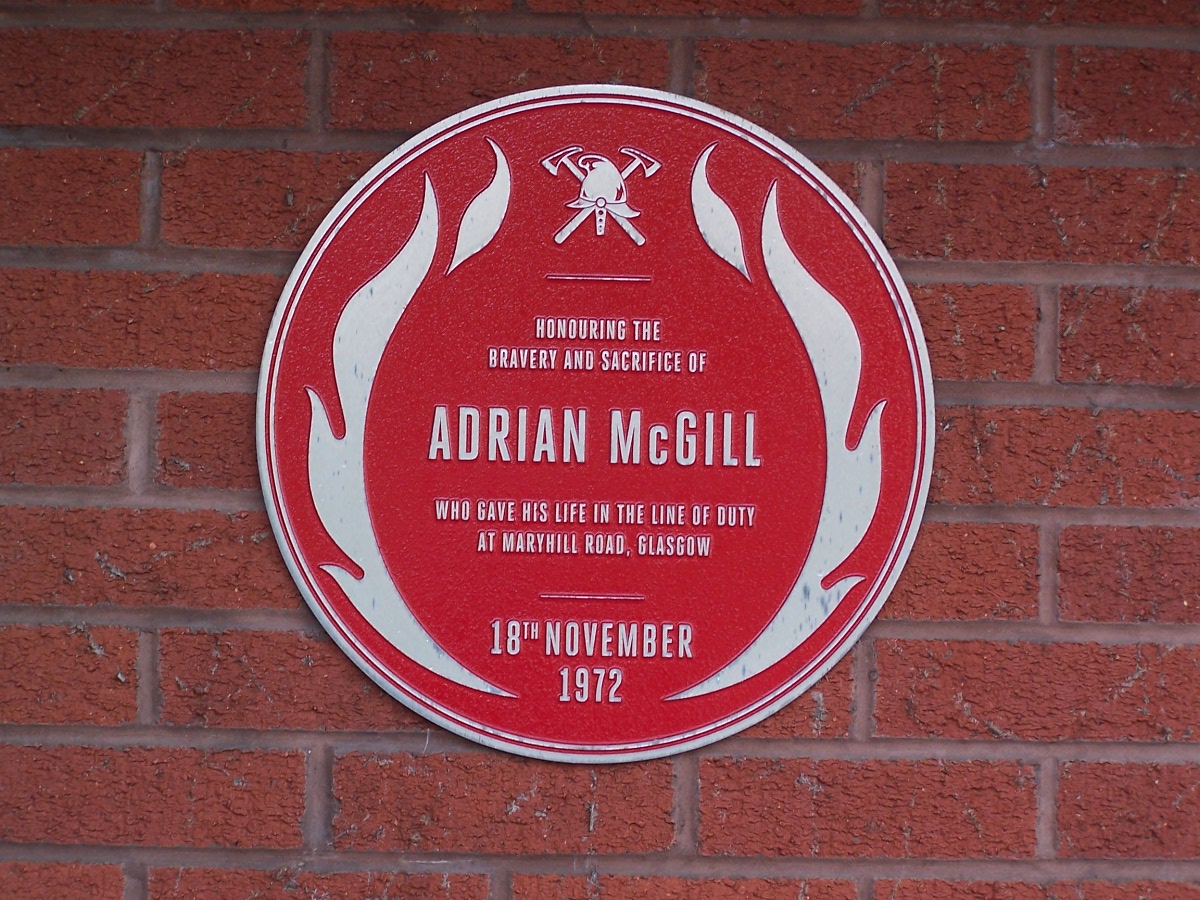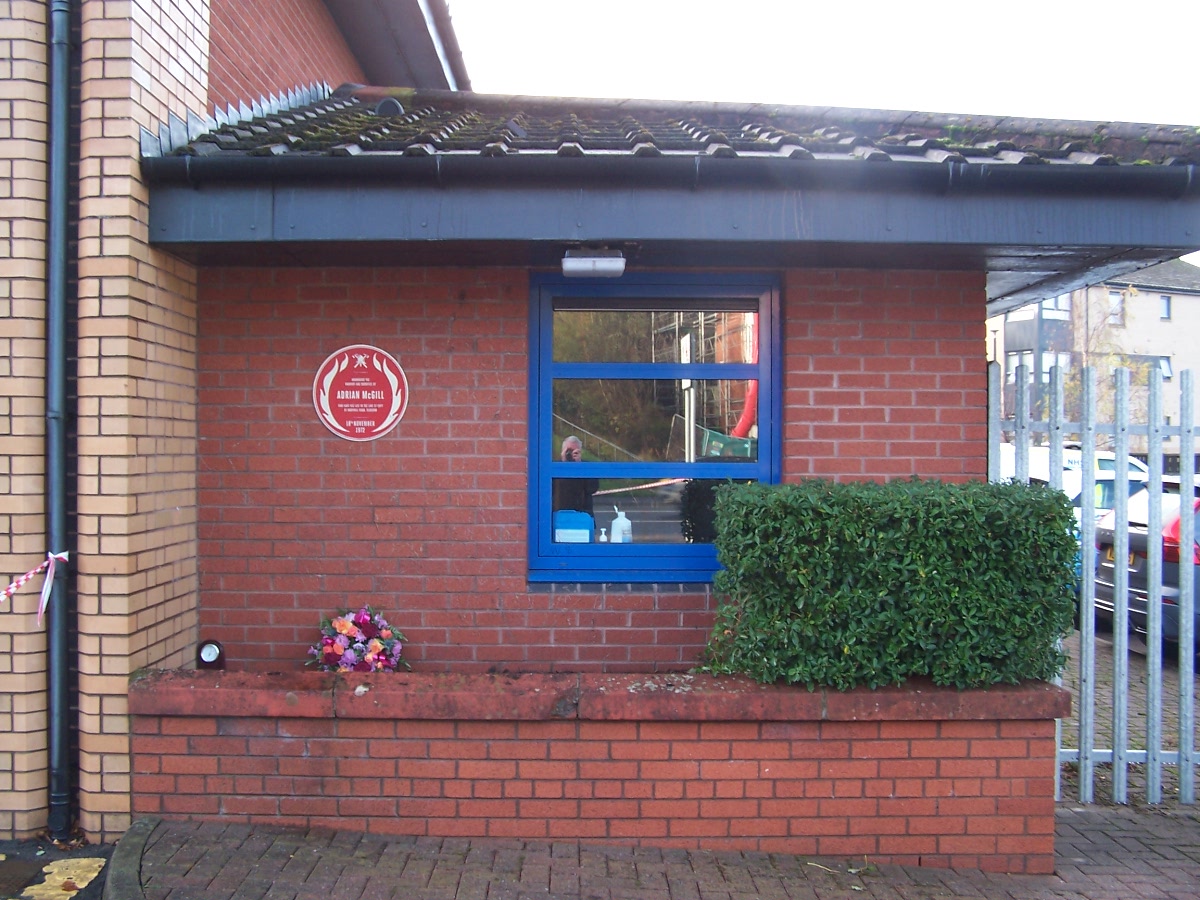
Sub Officer Adrian McGill died while rescuing a woman at a tenement fire in Maryhill Road on the 18th November 1972.
Demand for greater precautions after big fire.
By JAMES MURPHY
Mrs Nancy Ballantyne, convener of Glasgow Corporation police and fire committee, has called for a co-ordinating committee to deal with all aspects of fire fighting after a tenement fire on Saturday in which a fireman died trying to rescue a woman, who also died, and 31 other persons were injured.
Twenty seven firemen have lost their lives in the past 12 years fighting fires in the city. Another councillor, bailie Albert Long, has called for a full investigation by corporation officials to see if all proper fire precautions were taken.
Mrs Ballantyne’s request is made in a letter which she will hand to Mr William Gray, the Lord Provost, today. In the letter, she will ask that special attention should be paid to all disused property, particularly empty shops beneath occupied tenements.
The fireman who died on Saturday, Sub Officer Adrian McGill, was said yesterday to have sacrificed his life trying to save the woman, who was trapped on the top floor of a burning tenement in Maryhill Road, Glasgow.
Demolition
The woman Mrs Alice Mulgrew, age 48, died after she was brought down from a narrow ledge, outside her home by other firemen.
In her letter, Mrs Ballantyne refers to the fact that Sub Officer McGill is the eighth fireman to die this year in fires in the city, seven having died at a warehouse fire in Kilbirnie Street in August.
She will ask the Lord Provost to consider what steps might be taken to have all derelict property demolished, to have special precautions taken where shops stood empty beneath occupied tenements, and to consider measures to ensure the safety of firemen and the safe entry of fire fighting vehicles through narrow lanes which were sometimes blocked by cars.
Mrs Ballantyne’s committee are at present conducting a review of fire fighting measures which will not be completed until after a public inquiry into the death of the seven firemen, which is expected to be heard in the Sherif Court before the end of the year.
Fifty families were made homeless in Saturday’s fire, which began in a disused furniture shop beneath tenements in a gusher between Great Western Road and Maryhill Road.
Mr William Kelly, assistant firemaster of Glasgow, said that Sub Officer McGill had rescues several persons before he went back into the building to try and save Mrs Mulgrew. He had breathing apparatus with him so that he could administer oxygen to her if necessary.
His last words were shouted from the top floor to other firemen in the back court of the building, when he told them – “I have got that woman. We are all right.”
Mr Kelly said that his men found themselves fighting “two serious fires at on time – one in Great Western Road and one in Maryhill Road.”
Clothes needed
The flames had spread rapidly, helped partly by a void or channel between modern shop fronts and an older structure behind, he added.
At least 50 yards of the tenement block, which is part of a gusher at St George’s Cross, will have to be demolished, and sections of Great Western Road and Maryhill Road will be blocked to traffic until this has been done.
Members of Glasgow Corporation social work department were trying to arrange accommodation and clothing for some of the homeless families, many of whom were said to have “only the clothes they stood up in.”
Mr Gray said that he had been given the news of the fire shortly before he was due to switch on Glasgow’s Christmas lights.
He said he had considered cancelling the ceremony because of the fire, but had decided not to do so “for the sake of the children of Glasgow.”
After the ceremony Mr Gray went to the Woodside Halls and to the scene of the fire, as did Mr David McNee, the chief constable of Glasgow.
Bailie Albert Long (Labour, Woodside) claimed the houses in Maryhill Road which were destroyed by the fire were the responsibility of the Corporation.
They had been taken over by the city seven years ago in preparation for redevelopment, he said.
“I want to know what precautions were taken against fire in these tenements. I am extremely concerned that this building seemed to go up like tinder.”
Mr Laing said that he would be contacting both the sanitary department and the Dean of guild inspectors. He was concerned about the growth of multiple occupancy in the Woodside area.
This he said, led to the partitioning of rooms with the consequent growth of fire hazards.
“It is tragic that a fireman should die in a property owned by Glasgow Corporation when if proper precautions had been taken this would be completely impossible.”
Narrow ledge
One of the residents, Mr John Mathieson, aged 22, twice crawled along a narrow ledge about 50ft up, each time carrying a child from a neighbouring flat which he handed to a fireman on a turntable ladder placed against the tenement.
Mr Mathieson said yesterday that he had moved into the tenement on Friday. He added:– “When I looked out at the narrow ledge I thought to myself that I wouldn’t like to try walking on it.
“I didn’t realise that I would be doing it so soon. I couldn’t go through with that again, but I had no choice on Saturday for the sake of the two children, whose parents were out when the fire began.”
All but six of the families in Foresthall have now been given accommodation or have moved in with relatives and friends. A spokesman for the social work department said last night that all those left homeless would be rehoused.
UNDERGROUND AFFECTED
Glasgow’s Underground system will be out of action today with the exception of two shuttle services from St Enoch station to Shields Road, and Partick Cross to Govan Cross.
A transport department spokesman said last night:– “Saturday’s fire in Maryhill near St George’s Cross has made a stretch of line unsafe. We hope to be back in action by Tuesday.”
<2 PHOTOS> The scene yesterday as workmen tided up after a fire in which two people died on Saturday at St George’s Cross, Glasgow. Below; Mothers with their children, made homeless by the blaze, are given temporary shelter at Woodside Hall before being rehoused.
(The Glasgow Herald, Monday, November 20, 1972. Page1.)
Requiem Mass
By Staff Reporters
Requiem Mass for Sub officer Adrian McGill, the fireman who died will be offered today at St Saviour’s Church, Govan, by the Most Rev. Dr James D. Scanlan, Archbishop of Glasgow. Six firemen will be among the pall bearers at the funeral afterwards at St Conval’s Cemetery, Barrhead.
The funeral of the other victim, Mrs Alice Mulgrew, of 27 Maryhill Road, will take place tomorrow at St Kentigern’s Cemetery, Lambhill, after Requiem Mass at St Columba’s Church, Maryhill.
It was confirmed yesterday that the Post Office at St George’s Cross and the houses above which are affected by the fire, will have to come down.
(The Glasgow Herald, Wednesday, November 22, 1972. Page13.)
Courage of fire officer praised
By a Staff Reporter
Sub Officer Adrian McGill, the Glasgow fireman who died while trying to save a woman victim in the St George’s Cross tenement fire on Saturday, was buried yesterday at St Conval’s Cemetery, Barrhead.
Earlier, the courage and sacrifice of Sub Officer McGill and his colleagues in the Glasgow Fire Service, 27 of whom have died in the past 12 years while fighting fires, was praised by the Most Rev. Dr James D. Scanlan, Archbishop of Glasgow, at a Requeim Mass at St Saviour’s Church, Govan.
He said:– “So often our firemen have to risk their lives protecting us in Glasgow from fire. The example of this brave fireman and his predecessors who have given their lives so unstintingly and unhesitatingly will be an inspiration to all of us.”
CHILDREN
Mr McGill’s two older children, Stephen, aged nine, and Shirley, aged eight listened with their mother Aileen, at the front of the packed church as the archbishop continued:– “When his children grow up they will be to tell their children, and their children’s children of the epic heroism of their father.”
A third child, Alan is seven months old.
The service was attended by Mr William Gray, the Lord Provost, and a number of councillors, Mr George Cooper, firemaster, Mr David McNee, chief constable, other senior police and fire service officers, and hundreds of relatives and friends. Mr McGill lived in Orkney Place, beside, Govan fire station.
WREATH
After the service six firemen bore the coffin to the waiting cortege. Among the many wreaths at the graveside was one from the family of Mrs Alice Mulgrew, who Mr McGill was trying to rescue from her top floor flat in Maryhill Road. He had already rescued several others who were trapped. Mrs Milgrew will be buried at St Kentigern Lambhill, today after Requiem Mass at St Columba’s Church, Maryhill.
<PHOTO> The cortege leaving St Saviour’s Church, Govan, after the Requiem Mass yesterday for Sub Officer Adrian McGill, who lost his life in the St George’s Cross tenement fire. On the right is the most Rev. Dr James D. Scanlan, Archbishop of Glasgow.
(The Glasgow Herald, Thursday, November 23, 1972. Page3.)
Glasgow tenements fire
SUB OFFICER DIES IN VAIN RESCUE BID
Sub Officer Adrian McGill, aged 34, of Glasgow Fire Brigade, died in a vain attempt to rescue a woman from a block of tenements on fire in the St. George’s Cross area of the city. Four other firemen, including one who fell some 30 ft while trying to effect rescues, were treated for injuries in hospital.
Sub Officer McGill, who was married with three children, was the eighth Glasgow fireman to die in fire in three months—in August seven members of the brigade died in the Kilbirnie Street textile warehouse blaze—and the 27th to have lost his life in the last 12 years.
In the tenement fire Sub Officer McGill had assisted in the rescue of several people from the four-storey triangular block which included shops and faced on to Great Western Road and Maryhill Road. He went back into the building, taking a BA set with him, to rescue a woman from her top-floor tenement and was last seen alive on the top floor window ledge with her. She was subsequently rescued by other firemen but later died in hospital.
The fire is thought to have started in a disused shop and to have spread through a void between modern shop fronts and older structures behind until it involved some 50 yards of the Maryhill Road frontage and the tenements above. It further spread in the spaces between the shop ceilings and the first floor joists to involve the Great Western Road frontage and the tenements above that.
The brigade was thus faced with fighting a serious fire on either side of the block. Fifteen appliances were involved.
(Fire magazine, Vol. 65, Number 810, December, 1972. Page 316.)

Fire Brigades Union Red Plaque for Adrian McGill on the right hand side of the bays at Maryhill Fire Station. 103_1625 22/11/2025

Fire Brigades Union Red Plaque for Adrian McGill on the right hand side of the bays at Maryhill Fire Station. 103_1625 22/11/2025